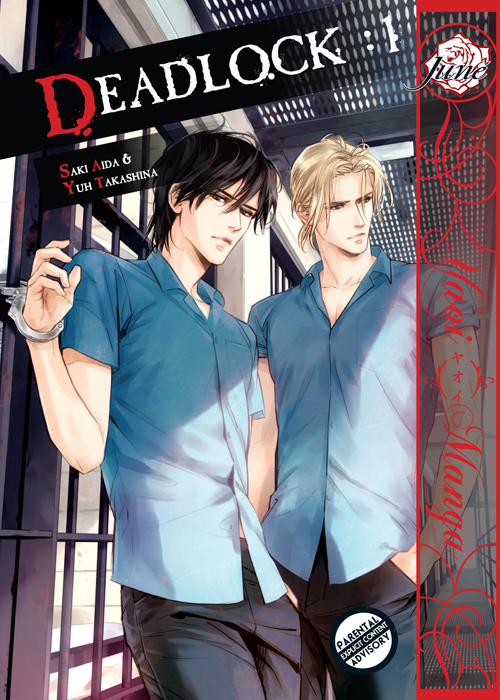Rating: 7
Juné 2014 - Tokuma Shoten 2012 - Chara 2011
1+ volumes
Translation: Leighann Harvey
The first volume of this prison drama series is a promising start to a plot-driven story featuring a cast of characters so good-looking that at times it looks like a prison for male models. Yuto Lennix is found guilty for a crime he didn't commit: the murder of his partner in the Drug Enforcement Administration (DEA). He is sentenced to fifteen years but an FBI agent offers him a chance at immediate release if he can find a suspected terrorist leader thought to be directing a cult organisation from inside prison. With no support, Yuto enters the California Schelger prison as just another inmate, determined to root out the terrorist leader and gain his freedom.
The immediate draw for this manga are those beautiful guys on the cover, how can they look so catwalk perfect in prison? The art throughout is good and the manga delivers on story too. The only comparison I have for prison manga is Sadahiro Mika's brutal and dramatic Under Grand Hotel series but Deadlock is an entirely different kind of story, it's a more sanitised, prettier version of prison life, less grim and muted in tone compared to the often melodramatic Under Grand Hotel. Its more understated approach makes for a more believable story, aided by a realistic prison setting created by author of the original light novel, Aida Saki, and adapted into this manga by Takashina Yuh (or Yuu, DMP can't seem to decide on standardising their romaji spelling).
There isn't any romance in this first volume which is not a bad thing since the story busies itself with world-building and establishing the large cast of characters. The depiction of prison life in itself is interesting and, as I found out after some googling, is based on the real life California state prison system. In the story, the inmates are housed in different blocks according to race and it is the race-based gangs who have the running of the place. Unfamiliar with American prisons (or any prisons), I was surprised to learn that this practice of racial segregation has indeed been used by California for many years, though there have been moves in recent years to curtail the practice on the basis of it being unconstitutional. Aida Saki obviously did some research as the names of the gangs are also adapted from real life gangs; the black group is called the Black Soldiers, a variant of the real life Black Guerrillas; the white group is called the ABL and, though the acronym is not explained in this volume, it's more than likely a variant of the real life Aryan Brotherhood.
Race is naturally a big theme in the story, the other big one being prison rape culture (though I'm not sure how true to life this aspect of the story is). This is BL so it's not like it's unexpected but it's still uncomfortable, to say the least. It's the norm for stronger inmates to take weaker inmates as 'substitute women' and Yuto is targeted by a leader of the Black Soldiers on his first day. Rape is constantly talked about but there is no actual rape scene in this volume. Generally, the manga shies away from depicting graphic violence, there are fights and murder but Takashina does not linger at all and those scenes are limited to a few panels. Though this results in less impactful drama, it does prevent the mood from turning too bleak. There's a general emotional distance to the story so although it's not depressing, it's also not as involving as it could be.
Along with his enigmatic cellmate (and obvious destined boyfriend), Dick, who's sometimes nice and sometimes cold, Yuto makes friends with a nice group of people who teach him about prison life, about the gangs and dangerous inmates to avoid. A lot of people are introduced in this volume and Takashina does enough to sketch out the personalities of each character as they appear so that they are distinct and memorable, though so far none of the characters have much depth. Yuto is a typical stoic hero and Dick is a lone rebel with a past type; they're still getting to know each other by the end of the volume so I'm prepared to reserve judgement on characterisation for later volumes when they do grow closer, though I suspect that in the end looks will win out over personality.
One issue I have with the story is with its treatment of the 'sisters', a group of transgender women inmates. The group is mostly there for comic relief and some cheap jokes are made at their expense. The plot and the writing are not particularly strong in originality but the cliched trans jokes are irksome, though they do probably mimic real life attitudes, especially of an all-male prison environment. However, Aida makes up for the casual discrimination with a strong supporting character in one of the women, a defender of her fellow sisters who are regular victims of rape and violence, and a respected figure among the inmates.
Volume one lays the groundwork for an interesting story, setting the stage and introducing the players, preparing for the plot to really kick into action in the next volume, which I look forward to (though it'll probably be a long time in coming since volume two isn't even out yet in Japan and then DMP are soooo slow). Characterisation certainly needs some work and the romance isn't even at the start line but the steady pacing hopefully means that the relationship won't be rushed into and we can anticipate a gradual romance developing between the bishies.

No comments:
Post a Comment